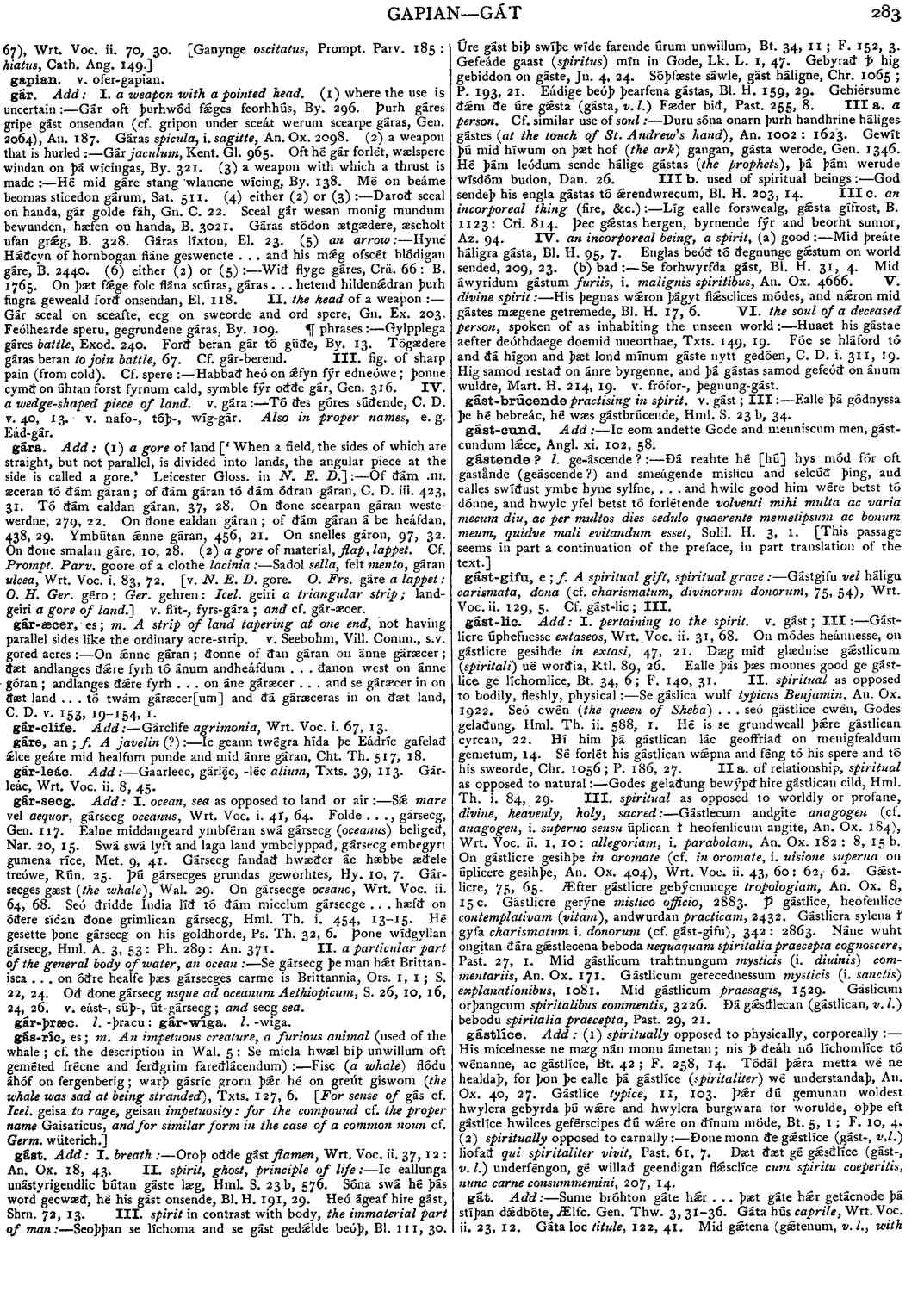gást
-
Oroþ oððe gást
flamen
,- Wrt. Voc. ii. 37, 12 : An. Ox. 18, 43.
-
Ic eallunga unástyrigendlic bútan gáste læg,
- Hml. S. 23 b, 576.
-
Sóna swá hé þás word gecwæð, hé his gást onsende,
- Bl. H. 191, 29.
-
Heó ágeaf hire gást,
- Shrn. 72, 13.
-
Seoþþan se líchoma and se gást gedǽlde beóþ,
- Bl. 111, 30.
-
Úre gást biþ swíþe wíde farende úrum unwillum,
- Bt. 34, II; F. 152, 3.
-
Gefeáde gaast (
spiritus
) mín in- Gode, Lk. L. l, 47.
-
Gebyrað ꝥ hig gebiddon on gáste,
- Jn. 4, 24.
-
Sóþfæste sáwle, gást háligne,
- Chr. 1065 ; P. 193, 21.
-
Eádige beóþ þearfena gástas,
- Bl. H. 159, 29.
-
Gehiérsume ðǽm ðe úre gǽsta (gásta,
v. l.) Fæder bið, Past. 255, 8. III a. a person. Cf. similar use of soul :-- Duru sóna onarn þurh handhrine háliges gástes (at the touch, of St. Andrew's hand ),
- An. 1002 : 1623.
-
Gewít þú mid híwum on þæt hof (
the ark
) gangan, gásta werode,- Gen. 1346.
-
Hé þám leódum sende hálige gástas (the prophets), þá þám werude wísdóm budon, Dan. 26. III b. used of spiritual beings :-- God sendeþ his engla gástas tó ǽrendwrecum, Bl. H. 203, 14. III.c
an incorporeal thing
(fire, &c.) :-- Líg ealle forswealg, gǽsta gífrost,- B. 1123: Cri. 814.
-
Þec gǽstas hergen, byrnende fýr and beorht sumor,
- Az. 94.
-
Mid þreáte háligra gásta,
- Bl. H. 95, 7.
-
Englas beóð tó ðegnunge gǽstum on world sended,
- 209, 23.
-
Se forhwyrfda gást,
- Bl. H. 31, 4.
-
Mid áwyridum gástum furiis, i.
malignis spiritibus
,- An. Ox. 4666.
-
His þegnas wǽron þágyt flǽsclices módes, and nǽron mid gástes mægene getremede,
- Bl. H. 17, 6.
-
Huæt his gástæ æfter deóthdæge doemid uueorthae,
- Txts. 149, 19.
-
Fóe se hláford to and ðá hígon and þæt lond mínum gáste nytt gedóen,
- C. D. i. 311, 19.
-
Hig samod restað on ánre byrgenne, and þá gástas samod gefeóð on ánum wuldre,
- Mart. H. 214, 19.
Bosworth, Joseph. “gást.” In An Anglo-Saxon Dictionary Online, edited by Thomas Northcote Toller, Christ Sean, and Ondřej Tichy. Prague: Faculty of Arts, Charles University, 2014. https://bosworthtoller.com/46964.
Checked: 0